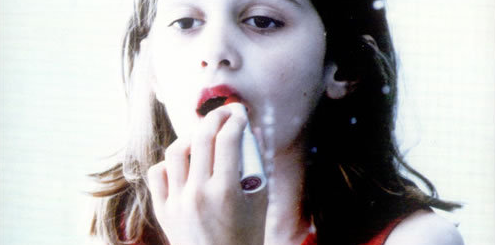Hang on to Your IQ by Placebo Lyrics Meaning – Decrypting the Anthemic Ode to Self-Preservation
Lyrics
Talks in haiku’s, plastic Venus.
Got a head rush, in her pocket
Two rubbers two lubes, and a silver rocket
[Chorus]
Hang on, hang on
To your IQ, to your id
Hang on, hang on
To your IQ, to your id
I’m lonely
Every morning, my eyes will open wide
I gotta get high, before I go outside.
Roll another, for breakfast
Burning clouds around, and in my solar plexus.
[Chorus]
I’m lonely
Legs eleven, makes me stay up late
Two fat ladies on my back, and now it’s 88.
I’m a fool, whose tool is small
It’s so minuscule, it’s no tool at all.
Hang on, hang on
To your IQ, to your id
Hang on, hang on
I’m lonely
Oh.
In a generation teeming with anthems of angst and alienation, Placebo’s ‘Hang on to Your IQ’ strikes a different chord—a harrowing narrative of maintaining self amidst the haze of hedonism and existential dread. Exploring the song invites us down a rabbit hole of introspection about intellect, identity, and the all-too-human desire to feel less alone.
As we dissect the cryptic lyrics penned by Brian Molko, Placebo’s enigmatic frontman, we expose layers of complex emotions that drive this song. It’s a labyrinth of metaphors that describe a balancing act between mind-numbing indulgence and the struggle to retain one’s cerebral sanity in a world that seems determined to erode it.
The Paradox of Pleasure and GPA – Unwrapping the Chorus
The chorus, a repetitive mantra, implores listeners to ‘Hang on, hang on’ to two defining attributes: the IQ and the id. A direct call to preserve one’s intellectual powers—the logical and the learned—contra the id: that primordial instinct base of desires. Here lies the enigma; a request to cling steadfastly to a balancing act as treacherous as it is necessary. With the onslaught of ephemeral escapes scattered throughout the verses, this dichotomic refrain becomes the pivot upon which the song spins.
Adjuring one to maintain a grip on intelligence while simultaneously acknowledging the primal aspects of our nature, Placebo presents an almost Sisyphean task for the protagonist. It’s a chant for the modern cerebral gladiator—wrestling with self-destruction and survival, teetering between indulgence and intellect.
A Haiku to a Plastic Venus – The Visceral Escapism in Verse
Molko’s lyrical prowess tangoes across a tapestry of seemingly incongruent images. A ‘Chinese masseuse’ and a ‘plastic Venus’ become the agents of a superficial nirvana, whispering in incomplete poetry of haikus, leaving much to interpretation. They’re symbols of the transient and often empty forms of pleasure sought as refuge—external remedies to internal turmoil that nevertheless demand their pound of cerebral flesh.
The vividly portrayed ‘silver rocket’ is not only a representation of drug paraphernalia but also perhaps a pivotal metaphor for the desire to escape—a psychological escapade from the mundane to a supposed nirvana that’s as alluring as it is hollow.
Smoke Rings of Self-Doubt – Dismantling the Second Verse
The second verse sinks into the depths of the narrator’s daily ritual, one that sees them needing a high just to brave the day. It’s a chilling confession of dependency, not only on substances but on the necessity of numbing oneself to face the sunlight of the everyday world. The imagery of ‘burning clouds’ and reference to the ‘solar plexus’ suggest a broiling turmoil within, a core at the cusp of being eclipsed.
Through the smog of ‘roll another for breakfast,’ Placebo sketches a portrait of a soul veiled in self-inflicted obscurity. The substance abuse is less about the chemical effects and more about an armor wielded against the vulnerability of exposure to the day’s reality. To be ‘high’ is not the objective; to be buffered from life’s sharper edges is.
No Tool At All – Self-Deprecation and the Human Condition
As Placebo weaves through ‘Legs eleven’ and ‘Two fat ladies,’ we trespass into the dimension of fate and chance. Gambling expressions juxtapose with stark self-deprecation, revealing a sexual insecurity in ‘I’m a fool, whose tool is small.’ The bravado culture of modern masculinity is pulled into sharp focus, peeling back layers to expose a fragile ego, dwarfed by its inadequacy.
This verse lunges at the heart of the song’s hidden meaning—our quest for significance. The relentless itch for validation, whether through intellect or physical acclaim, is a defining pursuit. Placebo dares to peel back the bravado to reveal the raw, often unspoken, vulnerabilities that so many struggle to reconcile with their sense of worth.
The Achilles’ Heel of Isolation – The Cult of ‘I’m Lonely’
In something as simple as the phrase ‘I’m lonely,’ Placebo summarizes the anthem’s soul. Between the cerebral jousting and flights from mediocrity, it is the fundamental human condition of loneliness that weaves its way through the narrative. Every act of escape and self-deprecation is underscored by this haunting admission, an echo that serves as both confession and explanation.
It’s the binding tie that makes ‘Hang on to Your IQ’ more than just a song—it’s the pulsating heartbeat of a generation. It’s Molko telling us that amid the circus of modern life, with all its distractions, vices, and noise, the quiet truth is a craving for connection, understanding, and indeed, an affirmation of existence beyond primal urges and intellectual feats.








